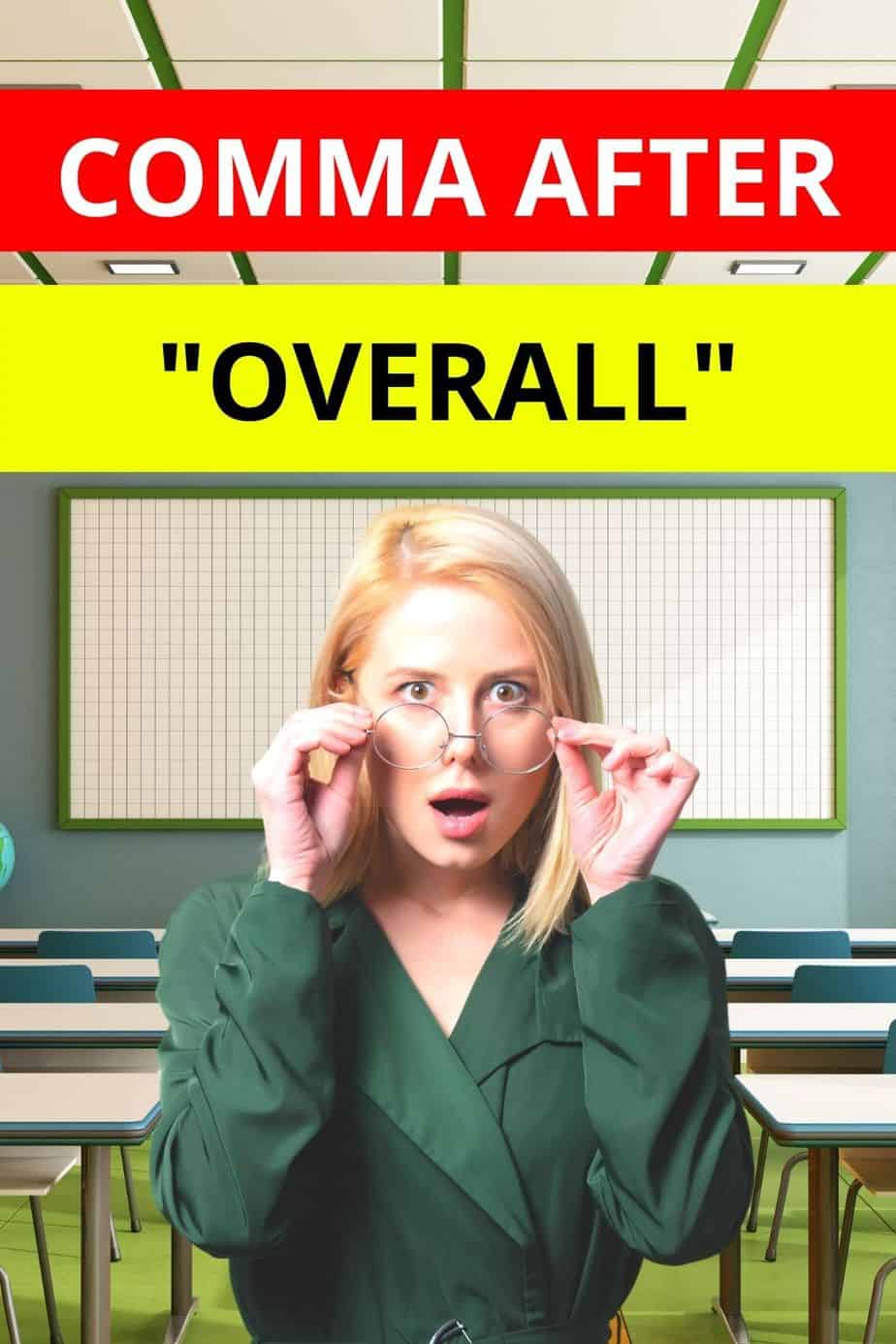What is the most annoying punctuation mark in English?
You guessed it right! Commas. But, are they really a hard nut to crack?
Please read through the end of this post, and you’ll find out how easy peasy it is to punctuate sentences with commas, especially with the word “overall.”
Do we always need a comma after “overall?”
Punctuating “overall” with a post-comma is necessary when it is used as an introductory adverb at the beginning of the sentence or after a semicolon. An after-comma is also required when “overall” ends the first clause in a compound sentence, as well as when it ends the first dependent clause in a complex sentence. Lastly, we need a post-comma too when it ends a mid-sentence parenthetical interruption. However, we need not place a comma after “overall” when it is used as a noun, an adjective, or when it causes a weak interruption, so long as the previously mentioned criteria on post-comma placement are not met.
The meaning and function of “overall”
“Overall” is a flexible word that may function as an adverb, adjective, or a noun in a sentence, in which the meaning varies depending on the context.
As an adverb, it is specifically classified as a conjunctive adverb or adverbial connector whose job is to summarize ideas or some set of items previously mentioned.
The adverbial sense of “overall” is similar to “all in all,” “generally,” or “in conclusion” which is necessary when we wrap our ideas up.
Next, it can also function as an adjective whose meaning is very similar to its adverbial sense, only with a different syntactic function.
While the adverbial task of “overall” is to cohesively sum pieces of information up, its adjectival role is simply to define a noun or a pronoun.
Lastly, we may also use “overall” as a noun which means, from the word per se, a type of clothing that covers the body from the neck to the ankle.
It usually functions as a protective garment on top of the first layer of clothing just like what painters wear, which is otherwise known as “bib and brace.”
“Overalls” are also related to “coveralls” which are used in heavy-duty work environments such as in an oil rig or cargo ship.
Since we already know the three different senses of “overall,” we are now ready to look at the conditions requiring the after-comma placement.
Guidelines in placing a comma after “overall” in more detail
Contrary to the common belief that the best writers have this special talent of memorizing rigid punctuation rules, commas are simply about logic and rhythm.
We often see lots of intimidating terminologies in comma-placement instructions which is why we feel that commas are quite complex tools.
These “rules” that we see are not necessarily set in stone, and therefore, must not be perceived in such a manner.
They are rather simplified guidelines that writers have come up with so that abstract concepts become more comprehensible and easier to remember.
You may not believe these claims, and that’s not a big deal, but, yes, the goal of these intimidating comma instructions is to make people’s lives easier.
So, what considerations do we have to take when punctuating “overall” with a subsequent comma?
Please read through the explanation and examples in the next subsections carefully so you won’t have to worry about this issue ever again.

When “overall” is used as an introductory element
Since “overall” is a conjunctive adverb, then it can be used to introduce an idea at the beginning of the sentence.
This is the most common and the easiest way to use the adverbial function of this word.
The example above is commonly observed in the conclusion part of an academic paper, thereby stressing the importance of summative adverbial connectors in the formal register.
When “overall” is used in a compound sentence
Another circumstance that prompts a necessary comma after “overall” is when we use it at the end of the first clause of a compound sentence.
Compound sentences made up of two independent clauses linked by coordinating conjunctions including “and,” “or,” and “but.”
We would know that a sentence is compound by looking at the presence of a subject and a verb in each clause.
We need to place the comma before the coordinating conjunction, and not after it.
In this type of sentence construction, the part of speech of “overall” doesn’t matter, therefore, we can use it in any of the three mentioned earlier.
When “overall” is used in a complex sentence
Besides the compound sentence structure, the complex sentence also necessitates a comma after “overall.”
A complex sentence is a combination of at least one dependent and one independent clause tethered by a subordinating conjunction.
Subordinating conjunctions such as “that,” “because,” or “unless” must not be preceded with a comma when they link the sentence midway.
However, a comma is necessary when the dependent clause introduces the sentence, particularly starting with a subordinating conjunction.
Commas are essential in separating clauses because they facilitate the rhythm of the sentence, which definitely helps in the readability of the sentence.
When “overall” is used after a semicolon
Semicolons, another punctuation mark that is apparently irksome for many, may also signal the placement of a comma after “overall.”
This is simply true because one of the functions of semicolons is to link closely-related arguments in one sentence.
In linking the second argument, we might need the connecting function of “overall” every once in a while, just like “hence” and “therefore.”
The semicolon in the sentence above helps in bridging the relationship of two ideas that are too closely related to be separated into two sentences.
A semicolon, therefore, functions a little bit more powerful than a comma but a little less than the period.
If you need to know more details about semicolons, you can check our other article covering this topic here.
When “overall” is used in a parenthesis
The last but not the least case that requires post-comma usage is with what we call “parenthetical elements.”
Parenthetical elements are interruptive thoughts inserted within a sentence to create emphasis to achieve a rhetorical effect.
And, they are offset with commas to mark their grammatical independence and dispensability from the rest of the sentence.
Parenthetical elements are discouraged in formal writing, by the way, because of how they disrupt the neutral tone of sentences.
There’s no comma after overall, when…
Now that the comma-placement guidelines have been laid out, it is also important that we know when not to use one in writing.
This section lists down the cases wherein putting a comma after “overall” is either incorrect or unnecessary.
Placing a comma after “overall” is incorrect when it functions either as a noun or adjective that doesn’t meet any of the criteria mentioned in the previous section.
Whereas, the post-comma is optional when it is used as a conjunctive adverb that only creates a very weak interruption.
Here are some examples to illustrate the explanation.
When “overall” is used as a noun that doesn’t meet the post-comma placement criteria
The nominal sense of “overall” can be used as a subject or an object in a sentence, just like how all nouns serve their function.
This holds for as long as it is not used at the end of the first clause in a compound or complex sentence, as explained a while ago, or as a final parenthetical element.
Here’s an example of using “overall” as a subject.
And here’s how to use it as an object in a sentence.
Again, when using “overall” as a noun, it simply works like other nouns in sentences, which is pretty easy.
When “overall” is used as an adjective that doesn’t meet the post-comma criteria
Another circumstance that would make a post-comma insertion incorrect is when we use “overall” as an adjective, again, without meeting the post-comma criteria earlier.
Just like other adjectives do, “overall” can modify nouns in sentences that roughly mean “entire” or “complete.”
Placing a comma after “overall” in the example above not only makes it grammatically incorrect but also off-beat which potentially leads to misinterpretation.
When “overall” causes a weak interruption
Finally, we may remove the comma after the introductory adverb when the sentence is too short and clear to create misinterpretation.
But of course, we do have to know that placing a post-comma is also possible and, hence, defined as an “optional” comma insertion.
The difference that the comma placement would make has something to do with the rhythm and focusing effect.
Without the comma, the short remark will be interpreted as a whole sentence with a neutral tone.
Meanwhile, putting the comma creates a more emphatic focus on “overall” because it prompts the reader to delay the intended remark a little bit.
Frequently Asked Questions
How can we use “overall” in a sentence?
Overall can be used three-way in a sentence, namely, as a conjunctive adverb, as an adjective, and as a noun. It is often used as a conjunctive adverb that means “all in all” at the beginning of the sentence, while its adjectival sense is similar to “entire” or “complete.” As a noun, it means a protective garment commonly used by painters to prevent spilling paint on their first-layer clothing.
What is meant by “overall”?
The meaning of “overall” varies depending on which part of speech it functions in a sentence. For instance, it can be used as a conjunctive adverb that means “in general,” an adjective that means “entire,” and a noun that means “garment that protects the first layer of clothes.”
Should we always put a comma after an introductory adverb?
Most of the time, a comma is placed after an introductory adverb to help the reader understand the message better. A post-comma may also be seen when the conjunctive adverb is used after a semicolon just like “hence” and “therefore.”
Conclusion
A language is so powerful that even a single word can have multiple meanings and functions that can only be understood when put in context.
It is nonetheless astonishing how punctuation marks like commas facilitate disambiguating the overall sentence meaning, as well as how one sentence element relates to another.
Hence, punctuation marks serve an inarguably beneficial purpose in the world of written languages, so we might as well use them appropriately.

Hey fellow Linguaholics! It’s me, Marcel. I am the proud owner of linguaholic.com. Languages have always been my passion and I have studied Linguistics, Computational Linguistics and Sinology at the University of Zurich. It is my utmost pleasure to share with all of you guys what I know about languages and linguistics in general.

